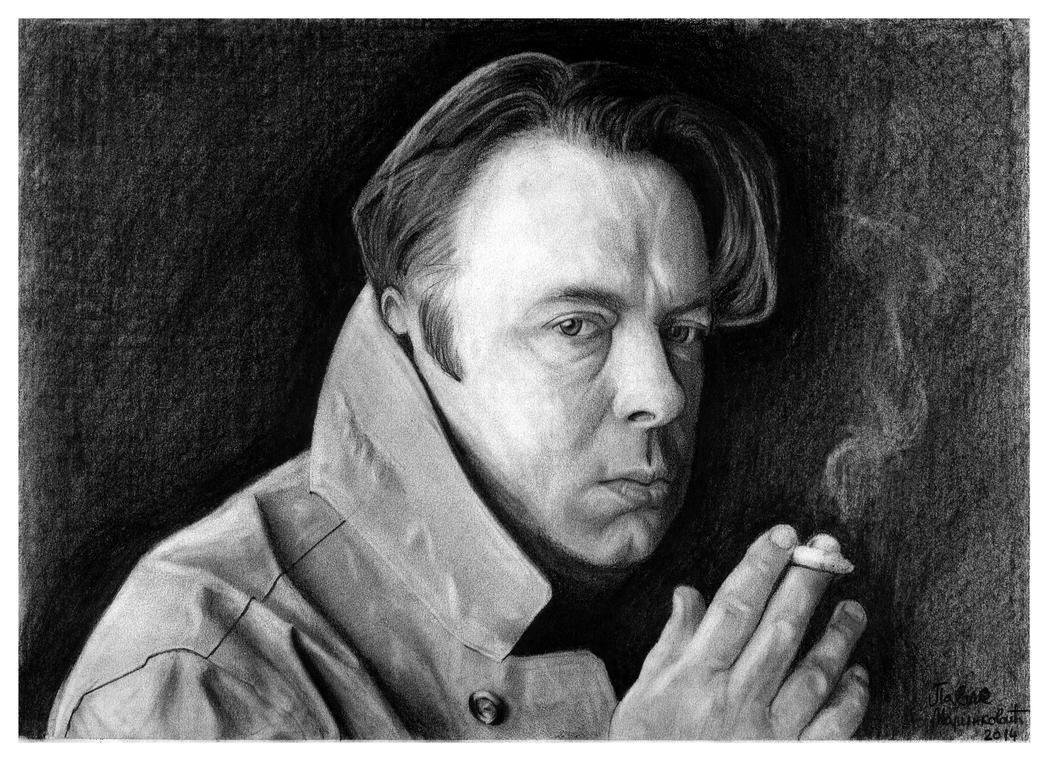In reading the “Stanzas of the Soul” which are the beginning point from which St John of the Cross sets out in his, “Dark Night of the Soul,” one gets the sense of a secret lover’s tryst. The lover sneaks out under cover of night, perhaps even climbing down a rose covered trellis into the shadows. One can feel the giddiness of delight, the euphoric joy of the lover at the imminent prospect of finding (and being found by) the Beloved in the mysterious blackness of the night. One can imagine the moon keeping vigil above, perhaps casting the shadowy silhouette of the Beloved whose presence gives the lover such thrilling joy. The soul seems to gasp, “There is my Beloved, so beautiful beyond all telling!” The faintest sign of him brings ecstatic sighs. In this scene, the peace is palpable. All that stirs is a breeze through the trees. One can see, in dim and shadowy shades, the embrace of lover and Beloved. The lover makes herself content, filled with joy that her Beloved should rest serenely upon her breast. She kept her beauty for him, untainted and untarnished. The shy flush of love makes her the more beautiful. In the still dark, the union is intimate and secret; none are present but the Lover and Beloved. This is the starting point from which one must set about journeying through St. John’s exposition of ‘The Dark Night of the Soul.’
The Dark Night of the Soul is an exposition on the first three stanzas of St John’s poem mentioned above, which read thus:
"One dark night,
fired with love’s urgent longings
---Ah the Sheer grace!---
I went out unseen,
my house being now all stilled.
In darkness, and secure,
By the secret ladder, disguised,
---ah, the sheer grace!---
In darkness and concealment,
My house being now all stilled.
On that glad night,
In secret, for no one saw me,
Nor did I look at anything,
With no other light for guide
Than the one that burned in my heart."
The Dark Night of the Soul is an incredibly deep and beautiful work of spiritual literature. In it, John of the Cross, a great mystic and Saint of the Catholic Church provides guidance, springing from intimate personal experience, to persons wishing to draw closer to God. St John (through his own saintly life and relationship with God) blazed a trail toward union with God and left signs and markers along the way for those persons who also wish to undertake the same journey.
The Dark Night of the Soul may be roughly divided into two sections: the first section is his explanation of what he calls ‘the dark night of the senses’ and the second is his explanation of, ‘the dark night of the soul.’ The former is more prevalently experienced and generally occurs in most persons who have exercised themselves for some period of time in virtue. The latter, is reserved only for a few, as the wisdom of God sees fit.
The book begins with an introduction of sorts into the state of beginners in the spiritual life. They are already ‘turned towards God’ so to speak and exercise themselves fairly consistently in goodness as they know how and are capable. This steadiness and consistency in virtue is the prerequisite for entering into the dark night of the senses, which is the first (and often the only) night the soul experiences. St John enumerates the many ways these souls suffer from imperfections (prior to purgation in the night of the senses) because their love of God is still very much mixed with love of self, disordered affections, and reliance on the senses. Through the dark night of the senses, God desires, “to withdraw [those beginners] from this base manner of loving and lead them to a higher degree of divine love.”
To St. John, the sensory and spiritual parts of the soul are interconnected; that is to say, the human person is a composite. Thus the one feeds off the other; the sensory and spiritual parts of the soul naturally affect each-other because human persons are a body-soul composite. In light of this, “God introduces people into this dark night to purge their senses, and to accommodate, subject, and unite the lower part of the soul to the spiritual part by darkening it.”
Prior to the dark night of the senses, the soul experiences much sensible consolation in devotions and prayers. “[G]race causes it to taste sweet and delectable milk.” Yet, God loves the soul too much to leave it this way; as the soul grows, its relationship with God grows as well. St John uses the analogy of a mother with her young child to describe the relationship. In order for the soul to “put aside the habits of childhood and grow accustomed to greater and more important things,” God, “like a loving mother,” withdraws the comforts he had given initially as a help to the soul in gaining devotion. This is the beginning of the dark night of the senses. This is the beginning also, of God’s teaching the soul of contemplation, “a secret and peaceful and loving inflow of God.” This contemplation, St John says, is what he meant in the poem when he wrote, “Fired with love’s urgent longings.”
The soul begins to experience aridity in prayer and difficulty and dryness in the will. In addition, the memory and intellect which formerly were a great aid in prayer are darkened. The “discursive meditation” by which the soul was formerly able to meditate using its imagination and understanding to focus in prayer is rendered ineffective. The soul feels that it has been “abandoned by God” because it does not experience him in the way in which it was accustomed, and is thus inconsolable. Yet even in this darkness, an interior “strength and energy to work” remains in the soul along with a solicitous and painstaking attentiveness to God’s service. As St. John says, “[T]he soul is beginning to taste the food of the strong.”
The graces of this first night are many. “The first and chief benefit … is the knowledge of self and of one’s own misery.” Without all of the consolations, the soul becomes more sober and begins to see itself as it truly is. Too, by depriving the soul of the help of the senses, the soul gains mastery over them and is no longer hindered by them in its efforts at virtue. St. John says referencing his poem, that this purgation of the senses is the, “sheer grace,” by which the soul, “went out unseen.” ‘Unseen’ means that the soul is no longer subject to the slavery of the senses, and is able to love God more perfectly. St John refers to the state of such a soul in his poem saying, “My house being now all stilled.”
Yet still Saint John says, that the “sensitive purgation… serves more for the accommodation of the senses to the spirit than for the union of the spirit with God.” Though the soul has made tremendous progress and loves God greatly in this state, yet there are still imperfections in the soul which only the ‘dark night of the spirit’ can cleanse. The dark night of the soul attends to ‘pulling up the roots’ of these imperfections, where the night of sense attended to ‘cutting off’ the various outward expressions.
In this night of the spirit, the soul experiences profound and unmitigated darkness. The soul, “feels that it is melting away and being undone by a cruel spiritual death.” The soul is removed even more drastically from every consolation; God, it feels, has forsaken it, as has every other creature. The soul is assailed with doubts and fears, which shake the it to the core. The torment of the night of the spirit, St. John says, is far worse than the night of the senses, such that, “the soul would consider death a relief.”
So much suffering can be disconcerting even to read about, especially when in reference to the action of a supremely good God in a devout soul. Yet, as St John explains, the suffering that the soul experiences in this night does not come from God, but springs rather from the soul’s own imperfection which makes it unprepared to fully receive divine light. St John says that, “[t]he clearer and more obvious divine things are in themselves, the darker and more hidden they are to the soul naturally.” Therefore, although God may be shedding the most brilliant of lights on the soul, this will initially be the occasion of deep darkness and great torment according to the measure of its own spiritual ‘blindness.’ The soul becomes painfully aware of its own wretchedness in comparison with the majesty of God and is convinced that God must ‘abhor it.’
Here St. John begins his explanation of the dark night of the soul by means of the second stanza of his poem.
"In darkness, and secure,
By the secret ladder, disguised,
---ah, the sheer grace!---
In darkness and concealment,
My house being now all stilled."
“In darkness and secure” means that the soul is not more prone to falling because of its sufferings in this night. Its hiddenness (departure from the senses) protects it from the cunning of the devil and the allurements of the world. The “secret ladder” refers to God’s new communication with the soul through what Saint John refers to as, “infused contemplation.” Whereas, before the soul played a more active role in occupying itself at prayer through meditation, now the soul must remain inactive and ‘passive’ to the action of God within it. “Disguised,” St John explains through an analogy on faith, hope, and charity. “Faith is an inner tunic of pure whiteness” that “blinds the sight of every intellect” and thus conceals her from the devil. Hope is “a green coat of mail… by which the soul is defended and freed from … the world” because it no longer takes stock of worldly things but fixes its eyes on heaven. Finally, charity is “a precious red toga,” through which, “the soul receives protection and concealment from the flesh.” The soul proclaims that the progress God has worked in it, that has brought it to this state is a, “sheer grace.” “[D]arkness and concealment” refers to the way in which God, through this new communication of contemplation, safeguards the soul from the interference of its enemies. As this pure and divinely infused contemplation does not take recourse to the senses, the evil one has no means of knowing about it, thus the soul is hidden. “My house being now all stilled,” is now repeated in this stanza in reference to both the sensory and spiritual parts of the soul. According to St. John, this means that, “the two parts of the soul are wholly at rest and strengthened.
St John finished with a short explanation of the third stanza of his poem in order to provide a little extra light on the topic before concluding his treatise.
"On that glad night,
In secret, for no one saw me,
Nor did I look at anything,
With no other light for guide
Than the one that burned in my heart."
The soul is described as being single-focused in the state referenced by this stanza, with no other desire but to find the ‘Beloved.’ Without even, “being able to look at anything,” the soul sprints, never checking up in pursuit of its Lord. In this pursuit, its guide is sure, because love alone burns in its heart and lights the way. The soul has been perfectly purified in sense and spirit. St John here leaves to the imagination, the raptures this soul will now experience, finally freed from itself and able to be dissolved into the Beloved.
Image Credits
https://ijboudreaux.com/category/dark-night-of-the-soul/
http://www.shakespeare-navigators.com/romeo/T22.html
http://brianalger.com/dark-night-of-the-soul-2/
Product is available for purchase at:
https://www.amazon.com/Collected-Ascent-Spiritual-Canticle-Letters/dp/0935216154












